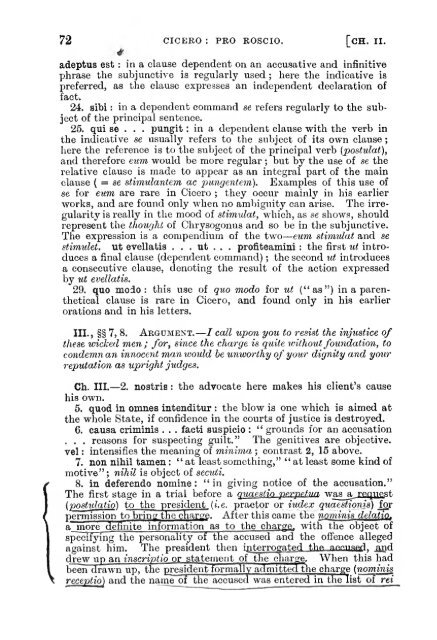Pro S. Roscio Amerino
Pro S. Roscio Amerino
Pro S. Roscio Amerino
You also want an ePaper? Increase the reach of your titles
YUMPU automatically turns print PDFs into web optimized ePapers that Google loves.
72 CICERO : PBO ROSCIO. [CH. II.<br />
adeptus est : in a clause dependent on an accusative and infinitive<br />
phrase the subjunctive is regularly used ; here the indicative is<br />
preferred, as the clause expresses an independent declaration of<br />
fact.<br />
24. sibi : in a dependent command se refers regularly to the subject<br />
of the principal sentence.<br />
25. qui se . . . pungit : in a dependent clause with the verb in<br />
the indicative se usually refers to the subject of its ovs^n clause ;<br />
here the reference is to the subject of the principal verb [postulat),<br />
and therefore eum would be more regular ; but by the use of se the<br />
relative clause is made to apjjear as an integral part of the main<br />
clause ( = se stimulantem ac pungentem). Examples of this use of<br />
se for eum are rare in Cicero ; they occur mainly in his earlier<br />
works, and are found only when no ambiguity can arise. The irregularity<br />
is really in the mood of stimulat, which, as se shows, should<br />
represent the thouyht of Chrysogonus and so be in the subjunctive.<br />
The expression is a conipendium of the two eum stimidat and se<br />
stimulet. ut evellatis . . . ut . . . profiteamini : the first ut introduces<br />
a final clause (dependent command) ; the second zit introduces<br />
a consecutive clause, denoting the result of the action expressed<br />
by ut evellatis.<br />
29. quo modo : this use of quo modo for ut ("as") in a parenthetical<br />
clause is rare in Cicero, and found only in his earlier<br />
orations and in his letters.<br />
III., §§ 7, 8. Argoment.—I call upon you to resist the injustice of<br />
these wicked men ; for, since Ihe charge is quite ivithout foundation, to<br />
condemn an innocent man would be unworthy of your dignity and yoxir<br />
reputation as upright jiidges.<br />
Ch. III.—2. nostris : the advocate here makes his clienfs cause<br />
his own.<br />
5. quod in omnes intenditur : the blow is one which is aimed at<br />
the whole State, if confidence in the courts of justice is destroyed.<br />
6. causa criminis . . . facti suspicio : " grounds for an accusation<br />
. . . reasons for suspecting guilt." The genitives are objective.<br />
vel : intensifies the meaning of miniyna ; contrast 2, 15 above.<br />
7. non nihil tamen : " at least something," " at least some kind of<br />
motive" ; nihil is object of secuti.<br />
8. in deferendo nomine : " in giving notice of the accusation."<br />
The first stage in a trial before a qv,ae.stin p erpetvn. was^aj^mispt<br />
( vostxdatio ) to the president (i.e. praetor or iiLdex quaestionis) for<br />
permission to bring the charge . After this came the nominis delatio.<br />
a more definite information as to the charfre. with the object of<br />
specifying the personality of the accused and the ofFence alleged<br />
against him. The president then interrogatpH thf^ anp.naprl, ^d<br />
drew up an inscriytio or statement of the charge, When this had<br />
been drawn up. the president formally admitted the charge (nominis<br />
receptio) and the name of the accused was entered in the list of rei<br />
—

















